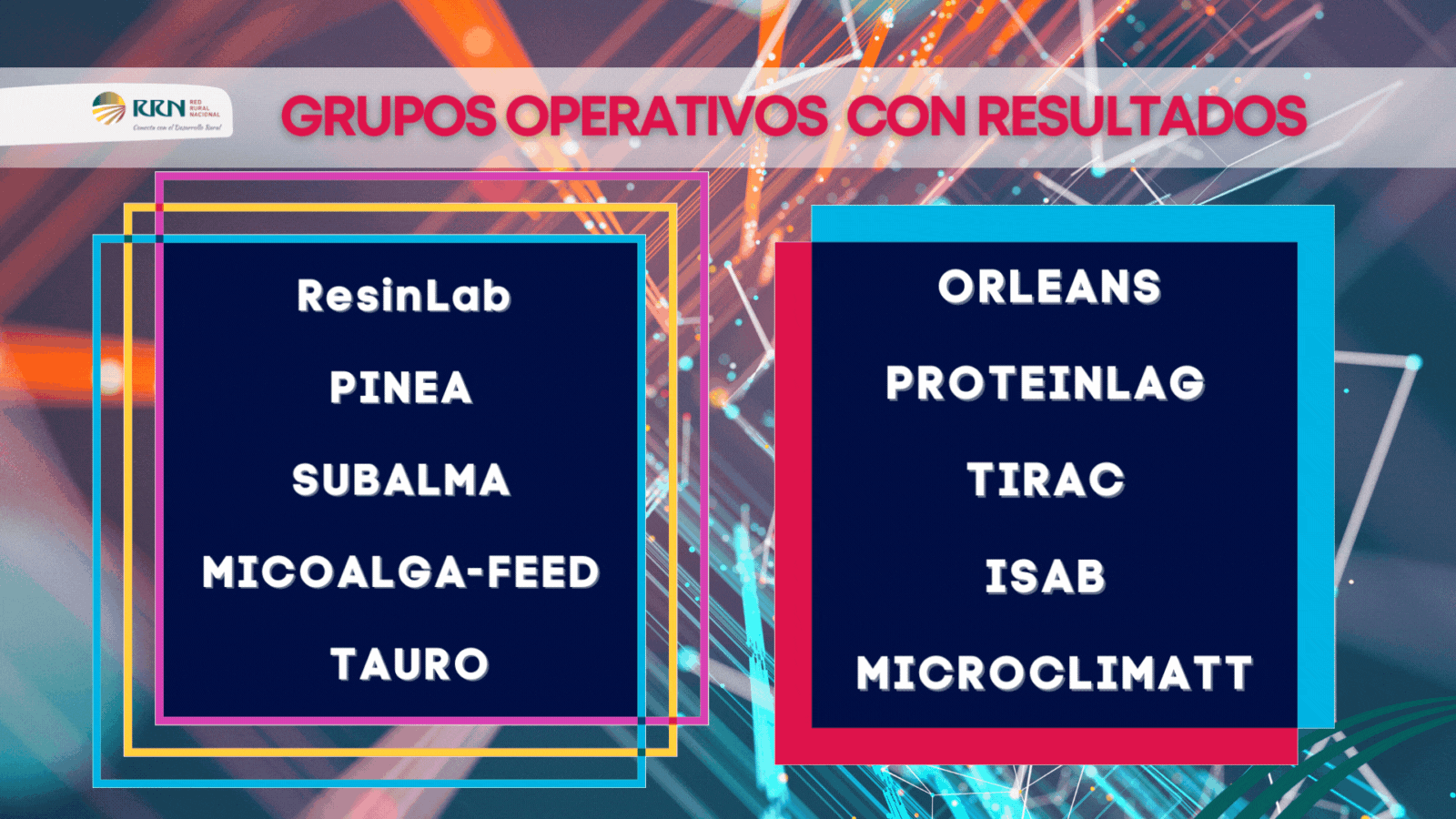
30 de March de 2023
Innovación
Ten events were held during the month of February to present the final results of their respective associated Operational Groups. These were innovative projects from the 2020 call, which has now concluded.
- Several Operational Groups have organized presentation events during the month of February to showcase the final results of their research and innovation projects.
- ORLEANS, PROTEINLEG, TIRAC, ISAB, Microclimatt, ResinLab, PINEA, SUBALMA and MICOALGA-FEED have completed their projects corresponding to the 2020 innovation call.
Operational Groups ( GGOO) are a group of rural stakeholders with diverse profiles who come together to implement an innovative project. These projects aim to find a solution to a shared problem or implement an innovative idea related to a particular rural sector.
Both the GGOO and innovative projects are funded through Rural Development Programmes (RDPs) , and are a tool used by the European Innovation Partnership for Agricultural Productivity and Sustainability ( EIP-AGRI ) to connect different stakeholders in rural areas.
Presentation of final results
Ten events were held during the month of February to present the final results of their respective associated Operational Groups. These were innovative projects from the 2020 call, which has now concluded.
The Operational Groups that have completed or are completing their activities are the following:
- GO ORLEANS : "Recovering Dairy Waste Through the Development of Bioactive Packaging ." Its main objective was to reuse surplus food from dairy products to create new food additives and packaging, all with the goal of generating a longer shelf life and a sustainable circular economy. They presented their final results onFebruary 23 .
- GO PROTEINLEG : 'Development of high-quality food proteins through sustainable production and processing of legume crops' . A group established to develop new sources of foods rich in plant proteins that are both healthy and palatable. The production and processing methods used are optimized and sustainable. On February 16, they shared their results.
- GO TIRAC : 'Innovative techniques for reducing antibiotics in rabbit farming' . Presented on February 9 , the results have made it possible to meet the objective of conducting questionnaires with those involved in rabbit farms, creating an inventory of algae and extracts for the formulation of feed that is less harmful to rabbit health , and launching a line of feed to improve their intestinal health and thus reduce the use of antibiotics.
- GO ISAB : 'Incorporation of information to improve animal health and welfare in the Spanish dairy cattle sector' . It has focused primarily on the development of a monitoring, diagnostic, and management system for animal health and welfare, as well as its production and functionality in the dairy cattle sector.
- GO Microclimatt : 'Study of the effectiveness of innovative biostimulants derived from microalgae to combat the adverse effects of climate change on tomatoes and wheat '. The National Rural Network ( RRN ) has echoed the results of the February 23rd workshop , where its leaders indicated that the biostimulant application process has met its main objectives and has allowed them to understand their mechanisms of action and their activity at the molecular level from the gene to the harvest.
- GO ResinLab : 'Network of Participatory Experimentation Territories' . In various informative sessions , GO has presented the results of its activities in Extremadura. Through these sessions, they have found innovative solutions that have led to the creation of three provincial resin associations, promoted the sector's activities, and identified resin producers' needs regarding training, assistance, and access to land.
- GO PINEA : "Improvements and innovation in national pine nut production ." The group has taken several actions to promote and protect the Iberian pine nut , such as establishing a harvest prediction system, providing management measures, and supporting the industrial sector in learning about the Leptoglossus occidentalis (American pine bug). They reported on this on February 16th at their final presentation day.
- GOSUBALMA : 'Improving the productivity and sustainability of subterranean drip irrigation systems that use olive oil mill waste as fertilizer through the use of nanobubbles' . This operational group presented its results on February 23 , following a project focused on improving sustainable practices and the competitiveness of olive oil mills by applying the circular economy.
- GO MICOALGA-FEED : 'Reducing antibiotics in livestock through natural feeding based on the use of fungi and algae' . MICOALGA-FEED was created to develop new feed formulations enriched with fungi and microalgae that can improve bird welfare and reduce the risk of disease. In conclusion, they have achieved their goal of using fewer antibiotics. They presented their results on February 9th .
- GO TAURO : 'Eco-efficient systems of differentiated quality: boosting the sustainability of bullfighting livestock' . This project has worked to prevent the disappearance of the fighting bull and the entire economic and territorial sector associated with it, preserving its habitat, its profitability—through the sale of meat—and contributing to local development and the sustainability of ecosystems. The results were presented on March 15 .
These projects are part of Measure 16 of the RDPs and involve the General Secretariat of Agriculture and Food, the General Directorate of Rural Development, Innovation and Agri-Food Training, and, specifically, the Subdirectorate General of Innovation and Digitalization.









